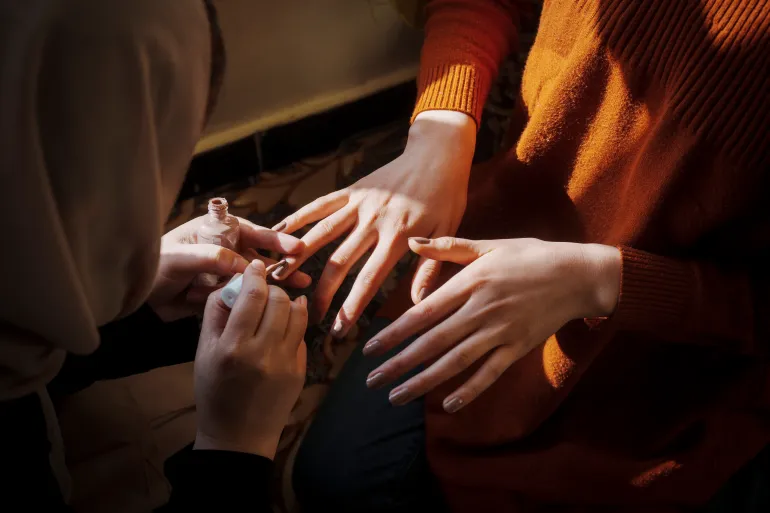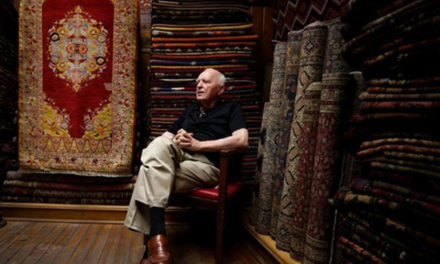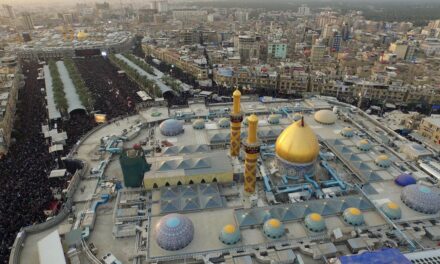A customer at a secret beauty salon in Kabul receives a manicure [Al Jazeera]
Kabul, Afghanistan – In an apartment near a Taliban headquarters, a young woman is discreetly moving about. Breshna* is 24 years old. Today, as on every day for the past year, her hands are sweaty and shaking. Yet her movements must be meticulous. She’s cutting the hair of one of her clients.
“In a week, my niece is getting married. It’s a big moment. You have to do your best,” says the customer, a woman in her 50s.
Comb in one hand, scissors in the other, Breshna concentrates. She has repeated these movements hundreds of times. Hair is her speciality, but above all, it is her livelihood. Mistakes are not an option.
The hum of the hairdryer both reassures and frightens her. “What if the Taliban hears us? I am afraid that the doorbell might ring. It could be them. They can come at any moment,” she whispers before handing the mirror to her customer.
Her client’s face lights up with happiness when she glimpses her reflection. This is the first time she’s been to an underground salon. Despite the fear, she does not regret coming. She will definitely be back to Breshna’s clandestine beauty parlour.
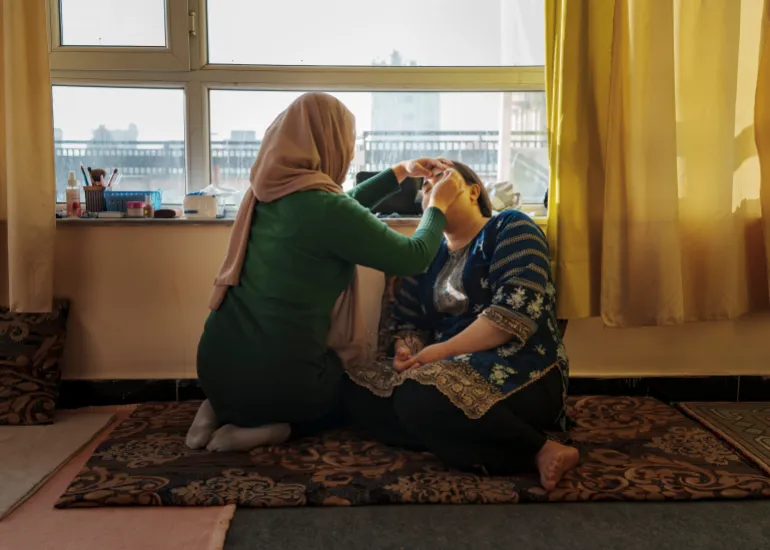
A client has her eyebrows tended to in secret [Al Jazeera]
Safe, female-only spaces – gone
In early July 2023, the Taliban announced the closure of all beauty salons across the country and proclaimed that a number of services, including eyebrow shaping, the use of other people’s hair and the application of makeup, interfered with pre-prayer ablutions required in Islam. No other Muslim-majority country in the world has banned salons, however, and critics say the Taliban’s treatment of women defy mainstream teachings of Islam.
According to the Taliban, beauty salons also put unnecessary financial pressure on grooms and their families.
Salons were some of the last businesses open to women as customers and workers. In a country where more than 12,000 beauty salons had flourished, the ban has had a devastating economic impact on the 60,000 women who worked in the sector. This decision also exacerbated the severe humanitarian crisis that at the time was already affecting 85 percent of the population, according to the United Nations Development Programme.
The fall of Kabul to the Taliban in 2021 resulted in the direct suspension of international humanitarian assistance, which previously had supported 75 percent of Afghan public services. Hunger, malnutrition, disease, climate-related disasters (including flooding and earthquakes), drastic rises in poverty and the near-collapse of the national health system are putting the Afghan population one step away from famine.
The restrictions placed on female aid workers, curbing their ability to work for humanitarian organisations, also worsened the crisis by making it nearly impossible to deliver aid to women and their children. The latter are disproportionately affected by the humanitarian crisis with 3.2 million children and 840,000 pregnant and lactating mothers facing moderate or severe acute malnutrition.
Beyond economic empowerment, the salons provided Afghan women with a much-needed community. “It was a safe, female-only space where we could meet outside of our homes and without a mahram [male guardian],” a former beauty business owner who did not want to be named for safety reasons tells Al Jazeera.
Banned when the Taliban were first in power from 1996 to 2001, beauty salons had proliferated across Afghanistan in the following two decades.
Many remained open in the immediate aftermath of the Taliban’s return to power nearly three years ago. But on July 25, 2023, all beauty salons permanently closed their doors.
Little by little, the walls have closed in on Afghanistan’s 21 million girls and women, who are confined to their homes, unable to study, work, travel or even walk freely.
Those who do risk heavy fines.
Despite this, some women have continued to operate secret beauty businesses. Some younger entrants have even chosen to set up new clandestine establishments.
Among them are former schoolgirls who have been deprived of their right to education since secondary-school for girls was banned in September 2021 and have entered the underground beauty market: a gesture of resistance driven by the need to feed their families and regain some semblance of a social life and a future.
“If the Taliban catch me, I would be taken to a special office. God knows what happens there,” says a 21-year-old makeup artist who did not want to be named. “They would also fine me 50,000 afghanis [$704] and warn or even attack my mahram. If you are getting caught a second time, you’ll be sent to prison.”
In 2022, a Taliban official admitted to Al Jazeera that Islam grants full rights to women to pursue education, work and entrepreneurship. The group has said multiple times that they are working to create a so-called “safe environment” for girls and women in secondary schools and the workplace. Despite this, the institutions remain closed to women.
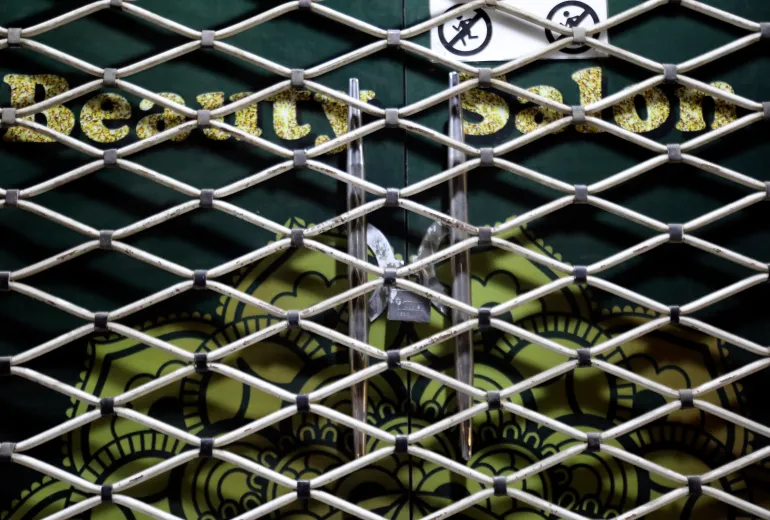
A lock is seen on a beauty salon door in Kabul on July 25, 2023, after the Taliban announced bans on beauty salons in Afghanistan [Siddiqullah Khan/AP]
‘The salon saved me from depression’
Breshna was one of many young Afghan women who began working in the beauty sector after the Taliban came to power. It has been almost three years since she last set foot in a classroom.
The first woman in her family to go to university, she dreamed at age 22 of becoming a diplomat. But when the Taliban came back to power, her ambitions were shattered.
Three months after secondary schools were closed to girls, women’s right to attend university was also removed. “I felt trapped,” Breshna says. “All of a sudden, my future was reduced to nothing. I realised that I would never go back to university.”
A few weeks after universities were closed to Afghan women in early 2022, Breshna found a low-paying job in a beauty salon while they were still officially open. It was a far cry from her original ambitions, but it provided food for her family and kept her from isolation.
With her father and brother seriously ill, she is the sole breadwinner. And with a monthly salary of 14,000 afghanis ($197), she struggles to cover all the family’s expenses.
At first, her skills were far from perfect, but the customers at the beauty salon became accustomed to the former student’s clumsiness, even finding it endearing. “They used to call me ‘the kohl diplomat’,” Breshna recalls nostalgically.
“I spent almost two years learning the techniques. It was difficult at first, but I developed a passion for hairdressing. I got really good at it. I became a favourite among the salon’s clientele. They saved me from depression,” she reflects before her voice fades.
On a morning in early July 2023 while scrolling through her Facebook news feed, Breshna learned that all the beauty salons had to shut down.
“After university, it was the beauty salons’ turn,” she says. “The only island of freedom that remained collapsed in front of my eyes. I was devastated. We had less than a month to pack up and close the business. On the last day, our customers, who were usually so happy, were all crying.”
Breshna held back her tears and decided to continue working secretly at her own risk. “The Taliban robbed me of my right to education. It was unthinkable that they would also take away my right to work.”
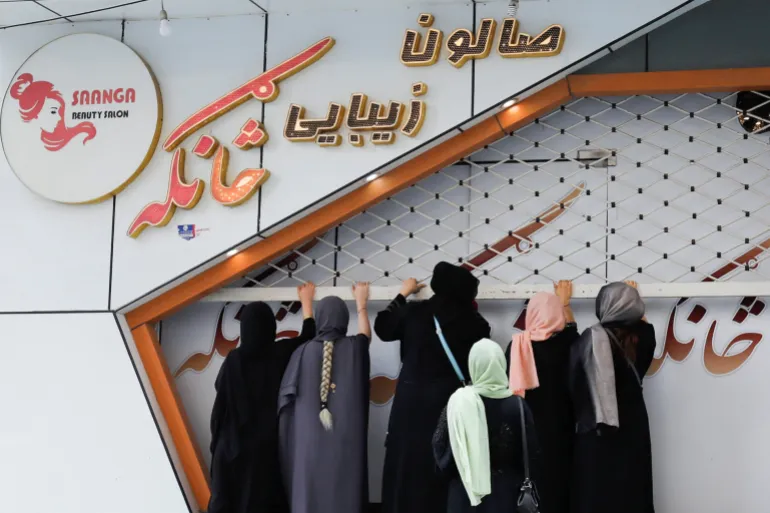
Afghan beauticians close their beauty salon in Kabul, Afghanistan, on July 24, 2023 [Ali Khara/Reuters]
‘Fear is not going to feed my family’
Mursal*, 22, is also defying the ban on working as a beautician.
Like many other young women, she could not face the prospect of sitting idle after she had to stop going to university. Mursal had already been working part-time in a beauty parlour to help support the family while she studied.
So, the day after the universities were shut to women, Mursal went to work full time and continued in secret after the beauty salons were banned.
“Although it was a dangerous decision, I didn’t hesitate for a second. Fear is not going to feed my family or get me back to university,” she says.
Many of her peers from university have made similar decisions.
“I worked to pay for my studies. Now I work to survive,” says Lali*, an underground beautician who had previously hoped to become a doctor.
For her, makeup brushes have replaced scalpels. Despite having her job, Lali says her mental health is at an all-time low. “I wish I no longer existed. I should be saving lives in the hospital, not risking mine to apply makeup to women.”
When she first entered the world of underground beauty, Breshna worked with only a few trusted clients. Word soon spread in her neighbourhood. Now she has more than 15 women regularly requesting her services.
Given her success, Breshna has had to take extra precautions. Her working hours are never the same, and she is very careful about her movements.
“I always take short cuts and avoid the cameras. The most dangerous time is when I buy makeup,” she says. Because she regularly needs to get new products for her business, she never makes too many purchases in one place to avoid being clocked by bazaar vendors.
The secret beauticians all run the risk of being turned in by neighbours, makeup suppliers or even fake clients who are spying for the Taliban. For Breshna, every trip is a valuable one. “When I go somewhere, I hide the straightener and hairdryer under my burqa or in a shopping bag so the Taliban think I’ve just come from the grocery store.”
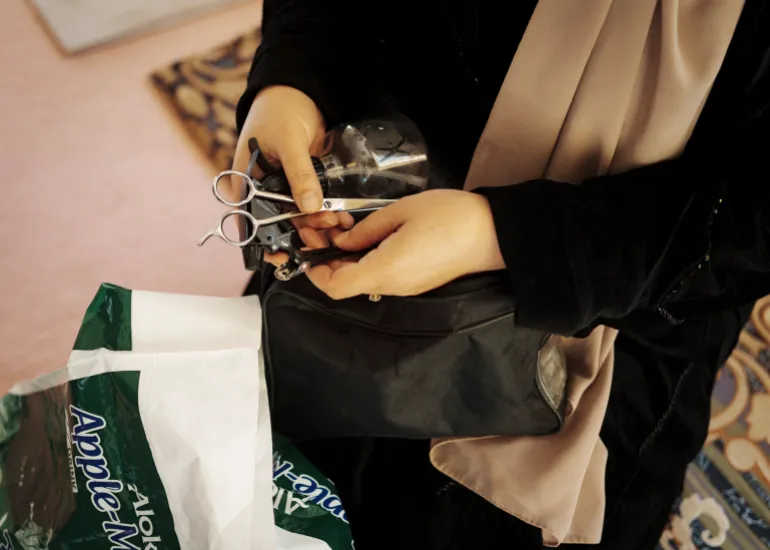
Secret beauticians carry supplies and equipment under burkas and in shopping bags to make it look like they have been to the grocery store [Al Jazeera]
‘We are the beauty resisters’
“I want to feel like a woman again,” one client tells Al Jazeera at an underground salon located in Kabul. With its gilded mirrors verging on kitsch and shelves overflowing with beauty products, it’s easy to forget that this customer is in a basement. And yet it’s in this improvised salon of about 20sq metres (215sq ft) that two sisters are bustling about.
Richly equipped and decorated with heavy red curtains, the atmosphere of the clandestine parlour is warm and cosy. Today, three customers are having a beauty treatment while their children play on the carpet. Only a few bursts of laughter and the sound of brushes tapping on makeup palettes can be overheard.
Hamida* is a former footballer and now a secret beauty treatment client. Once a month, she visits a secret salon to get her nails done. To ensure her safety and that of the makeup artists, she always comes out wearing black gloves that cover her long and colourful nails.
“The Taliban have no idea that we protect our freedom under the rules that they impose on us,” Hamida says.
“When the beauty salon moved to a secret location, I was reluctant to go,” another customer says. “I was afraid, but I have to honour the courage of those who continue to work. This is a war against women, and we are the beauty resisters.”
Despite the fear and mass surveillance introduced by the Taliban to better track the movements of the population and hinder the presence of women in public spaces, these women say they are determined to continue.
“We are left with no other choices. They banned us from university. We’ll continue to read. They banned beauty salons. We’ll continue to work ” a young beautician says defiantly.
*Names have been changed to protect anonymity.
